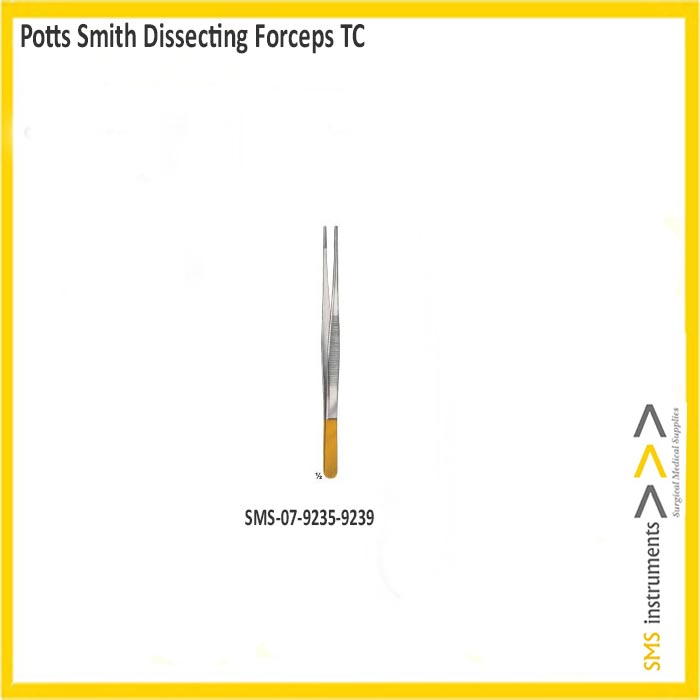Description
Potts Smith Dissecting Forceps TC
Sizes:
SMS-07-9235 = 15 cm
SMS-07-9236 = 18 cm
SMS-07-9237 = 20 cm
SMS-07-9238 = 23 cm
SMS-07-9239 = 25 cm
Dissecting Forceps With Tungsten Carbide Inserts
Additional Information
| Surname |
Potts Smith |
| Curvature |
Straight |
| Size / Model |
15cm-25cm |
| Handle |
Thumb Forceps |
| Working Surface |
Cross-Serrated Tungsten Carbide |
| Tip Configuration |
Blunt |
| Instrument Type |
Dissecting Forceps |
| Material |
Tungsten Carbide / Stainless Steel |
| Disposable or Reusable |
Reusable |
| Rusting Prevention |
Passivation Processed |
| Cleaning |
Ultrasonic Cleaned |
| Sterile or Non-Sterile |
Non-Sterile |
| Latex or Latex-Free |
Latex-Free |
| Test Performed |
Boil, Shape & Performance Test |
| Grade |
Premium OR-Grade |
| Packing |
Individually Packed in SMS Brand printed Poly-sleeve |
Tungsten Carbide (TC) is harder than stainless steel. Surgical instruments with tungsten carbide inserts in the tip offer a stronger grip, and they last longer. Tungsten carbide instruments generally have golden handles.
Tungsten Carbide known as TC Forceps are thumb forceps often used in small surgical sites to grasp tissues. They have fine, narrow jaws that are commonly used in plastic surgery.
TC instruments are designed to stay sharp for a significantly longer period of time than other standard instruments. SMS technology make it sure to permanently bonds tungsten carbide inserts to the instrument, which maximizes control and precision.
Tungsten Carbide Material Information: The notable and rare combination of physical properties possessed by tungsten carbide makes it useful for a variety of applications. It is extremely strong and wear-resistant. There are only a few materials on earth that can be used to cut or engrave tungsten carbide, with industrial diamond abrasives being one of these. Its tensile strength is very high, but it is brittle under high pressures as a result. The melting point of tungsten carbide is also very high, at 5,200 degrees Fahrenheit (2,870 degrees C). To boil, it must be heated much further, to an astronomical 10,382 degrees Fahrenheit (6000 degrees C).
Experience the Perfection: Our Top Brands Delivering Precision Instruments
SMS (Surgical Medical Supplies)
Experience excellence without compromise with SMS instruments. Crafted to the highest standards from premium stainless steel, our instruments offer unparalleled quality and cost-effectiveness. Designed to meet your exact specifications, SMS instruments provide the perfect solution for tight instrument budgets without sacrificing quality.
Relpro
Step into a world of premium surgical instruments with Relpro. Crafted by skilled UK craftsmen from high-quality stainless steel, Relpro instruments offer superior quality and value compared to other sources. From General Instruments to Specialty Instruments tailored for various surgical procedures, Relpro offers a comprehensive range to meet your needs with precision and reliability. Choose Relpro for instruments that exceed expectations without exceeding your budget.
Our Packaging: Elevating Instrument Experience with SMS and Relpro Brands!
Experience excellence with our stainless steel SMS and Relpro instruments, each laser-etched with brand logos, catalog numbers, and relevant details. Packed in premium zipper poly-sleeves with eye-catching barcoded labeling, our packaging ensures traceability and professionalism, giving our dealers, customers, and worldwide distributor networks a competitive edge.
For Deliveries Across Malaysia
We strive for prompt delivery of your order, aiming for the shortest possible timeframe. However, certain circumstances such as shipping delays, out-of-stock items, and late order processing may cause delays. We apologize for any inconvenience caused and will promptly notify you of any significant delays.
Free Delivery Nationwide
Peninsula Malaysia: Minimum 3 working days
East Malaysia: Minimum 5 working days
Courier Service Details:
Deliveries are made between 9 am to 6 pm, Monday to Friday (excluding public holidays).
Order Processing:
i. Confirmed orders received before 12 pm will be packed and collected by the courier service on the next business day.
ii. Orders received after 12 pm on Friday will be processed and collected by the courier service on the following week's working day.
Once your order is packed, you'll receive an email notification confirming dispatch. The email will also contain the consignment note and a URL to track your order's status.









